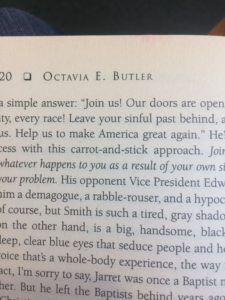Taking inspiration from Schenwar’s section “Hurt People Hurt People” from Locked Down, Locked Out, I started to think about the cycle of violence we see in Butler’s Parable. When I think of violence being the performance of waste it makes me think that violence is a cause and a consequence of something being allowed to literally deteriorate or waste away. In Parable, we see things deteriorating everywhere. Homes, communities, local and federal government, families, infrastructure, even lines between right and wrong seem to blur together as society seems to waste away.
Keeping this in mind, I want to touch on the people in Parable who are affected by the violence they encounter on a day to day basis. As Schenwar points out, there is an unceasing and cyclical history of people committing violence and harm to others if they themselves have been victims of violence and harm. This is evident when we see how the poor interact with each other in Parable— the poor steal from the poor, but only because they’ve a) been stolen from before, b) have no other options, c) have never had any other options or d) all of the above. This leads to entire communities abusing and harming one another. Resentment and mistrust builds, and things seem to turn into anarchy.
I’ve been thinking about this throughout my entire reading of Parable. That’s why when Lauren thinks. “I wonder what a badge is, other than a license to steal.” I stopped reading and thought for a moment. From Lauren’s perspective, police are already in a position of power over her. Why would they need to steal from the already poor, deteriorating communities they are supposed to be protecting? Do they really have as much power as Lauren and the readers perceive? Really, what’s their damage? Is it just the mere fact that they have power over another that causes them to harm others? Or is there more to it? I don’t mean to play Devil’s Advocate (or maybe I do), but how are we sure that there isn’t violence affecting them as well?
I don’t know the answers to any of these questions, nor am I sure if it’s valid to really spend time asking them. But! I do think it’s valuable to look at from Schenwar’s point of view when considering the vast majority of people who are supposed “perpetrators” are also victims of violence themselves. (I also want to point out that when I’m talking about police I’m talking about the police in Parable, not real life. Although once again, maybe the lines between the two aren’t as clear as I’m perceiving!) Thoughts?

